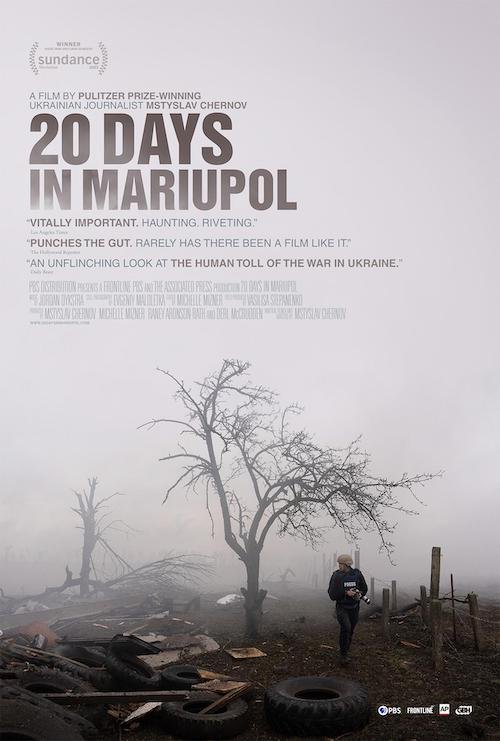20 Days in Mariupol
Written by Andreas Babiolakis
The attack on Mariupol, Ukraine February 2022 has not left the minds of anyone. The bloodshed of the Russian takeover of Ukraine still continues as the largest attack on a European country since the Second World War. There’s no sugarcoating the devastation caused, and so any depictions of the besieging of Mariupol have to be as direct as possible. There's a reason why Mstyslav Chernov’s documentary, 20 Days in Mariupol, has been heavily discussed this awards season: it is as upfront as any depiction of the Russian bombing of Ukraine as can be (perhaps the most transparent version we’ve seen thus far). Chernov and a team of journalists are there on February 24th to document the start of Russia’s attack, which happened right as soon as leader Vladimir Putin’s speech to the world concludes (without a second’s moment to react). The footage is already upsetting, with houses being destroyed and Ukrainian citizens fleeing and worrying about where they should hide or immigrate to. This is only the beginning.
Chernov counts the days and the situations get progressively much worse. Entire blocks are in ruins. Hospitals are being targeted. Countless lives are cost, and the vast majority are those of innocent civilians. We follow the aftermath of Ilya, a child who was playing soccer on a field when his legs were blown off by a bomb; he sadly didn’t survive the attack. This is only just one such example of many that we see. The attacks themselves seem to get more horrifying as well, as Chernov and company are caught in the thick of air raids and tank patrols, having to flee from checkpoint to checkpoint, all in the name of capturing the atrocities taking place. Electricity is cut. Nourishment is hard to come by. It’s becoming harder and harder to even exist in Mariupol, let alone succeed in it. 20 Days in Mariupol features all of the weight and fear felt. At first, twenty days seems like a short duration of time to get a point across. Twenty minutes into the film, I felt like one day was way too many to bear such an onslaught of shrapnel and destruction. How the hell Chernov and company got this footage out in one piece is a miracle.
It feels difficult to believe everything you see in 20 Days in Mariupol because of how shocking the entire documentary is.
The film never lets up, because there sadly wasn’t ever a moment of relief for Chernov and everyone else featured. 20 Days in Mariupol isn’t assembled as a series of instances like Chernov probably would have preferred. It’s an actual story of survival as you follow the team in search of shelter. Chernov’s voiceovers help detail what is going on more than what we see, adding extra importance to every minute of this harrowing film. For example, we see Chernov talking to other survivors about a plan to escape Mariupol, when his narration pops in to inform us that, should they be caught, Putin’s government will torture them into “admitting” that their documentary is full of lies should it ever get released. This adds to a film that already felt heavy enough; it becomes overwhelmingly grave and distressful. What gets captured in 20 Days in Mariupol feels like a fictional film, and yet this is real life. I was shocked for an entire hour and a half. I sat arrested in my seat. You obviously read about wars and bombings and see short clips of such disasters in the news, but to be this close to it all like you are in 20 Days in Mariupol is something else. To see this many wounded or slain people surrounded by this amount of carnage is difficult for anybody to bear. As Chernov states early in the film, it has to be this way. The world needs to see the scope of how bad these attacks are. 20 Days in Mariupol plants you in the thick of it; there’s no escaping the horrors that many are still facing worldwide, be it in Mariupol, the Israel-Hamas war, and so many other parts of the world riddled by devastation. This film is utterly heartbreaking.
Andreas Babiolakis has a Masters degree in Film and Photography Preservation and Collections Management from Toronto Metropolitan University, as well as a Bachelors degree in Cinema Studies from York University. His favourite times of year are the Criterion Collection flash sales and the annual Toronto International Film Festival.






